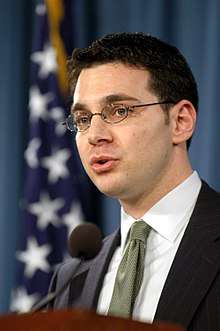Matthew Waxman
Matthew C. Waxman (born about 1972[1]) is an American law professor at Columbia University and author who held several positions during the George W. Bush administration.[2][3] He is also currently a Fellow at the Hoover Institution on War, Revolution and Peace.[3]

_and_Matthew_Waxman%2C_DASD-DA.jpg)
Education
Waxman is a graduate of Yale College[3] summa cum laude,[1] where he studied political science and international studies,[2] and Yale Law School. He served as law clerk to Supreme Court justice David H. Souter and U.S. Court of Appeals judge Joel M. Flaum and is a member and international affairs fellow of the Council on Foreign Relations.[3] He was a Fulbright Scholar at King's College London, where he studied military history.[1]
Government service
Waxman was described as working within the Bush administration, unsuccessfully, to have U.S. captives treated in accordance with the Geneva Conventions.[4][5] Waxman served under Condoleezza Rice in the National Security Council in 2001-2003.[3] He served as the first Deputy Assistant Secretary of Defense for Detainee Affairs in 2004 and 2005. Waxman moved from the Department of Defense to the Department of State in December 2005, serving there under Secretary of State Condoleezza Rice until 2007.
Later career
Waxman accepted a position as a Professor of Law at Columbia Law School in 2007.[6] Waxman currently serves as the Liviu Librescu Professor of Law[7] and faculty chair of the Roger Hertog Program on Law and National Security.[8]
On August 28, 2010, Waxman was quoted by Charlie Savage on the front page of the New York Times criticizing the Barack Obama Presidency for choosing to prosecute Canadian Omar Khadr who was only 15 years old when he was captured.[9][10]
In early 2012, as the Obama administration prepared to try Khalid Sheikh Mohammed at Guantanamo Bay detention camp, Waxman said on NPR it would "be a big year for military commissions. ... [T]he Obama administration [is] taking ownership of military commissions .... They are basically saying: We've corrected the problems of the Bush administration, and we're now going to use this as a tool in combating terrorism .... There are a lot of doubters out there who see military justice and the military commission system as tainted or illegitimate .... The Obama administration wants to turn around that perception."[11]
Personal
Waxman is a son of Merle Waxman and Dr. Stephen G. Waxman. His parents were both employed at Yale Medical School, his mother as an administrator and his father as a neurologist. Waxman married Wendy Katz, a graduate of Columbia and Bank Street College who had worked for Hillary Clinton and Andrew M. Cuomo, in 2009. She is a daughter of the late Rosalie Katz and the late Daniel P. Katz. Her mother was with Downtown Realty Management in Great Neck, New York and her father was a senior executive with Kinney System.[1]
Publications
- Daniel Byman, Matthew C. Waxman (2000). Confronting Iraq: U.S. policy and the use of force since the Gulf War. Rand Corporation. ISBN 978-0-8330-2813-6. Retrieved 2009-05-06.
Matthew Waxman.
- Daniel Byman, Matthew Waxman (2002). The dynamics of coercion: American foreign policy and the limits of military might. Cambridge University Press. ISBN 978-0-521-00780-1. Retrieved 2009-05-06.
- Matthew Waxman (2005-08-20). "Beyond Guantanamo". Washington Post. p. A17. Retrieved 2009-05-06.
- Matthew Waxman (2007-10-28). "The Smart Way to Shut Gitmo Down". Washington Post. p. B04. Retrieved 2009-05-06.
- Matthew Waxman (2008-11-08). "Reponse by Professor Matthew Waxman, "International Standards for Detaining Terrorism Suspects: Moving Beyond the Armed Conflict-Criminal Divide."". Opinio Juris. Retrieved 2009-05-06.
- Matthew Waxman (2009-01-21). "Closing Guantanamo is way harder than you think". Foreign Policy. Archived from the original on 2009-04-28. Retrieved 2009-05-06.
References
- "Wendy Katz, Matthew Waxman" (limited no-charge access), The New York Times, August 15, 2009. Retrieved 2012-01-05.
- "Matthew Waxman". Columbia Law School. Archived from the original on 2009-05-06.
- "Matthew Waxman: member of the Task Force on National Security and Law". Hoover Institute. Archived from the original on 2009-05-06.
- Steve Clemons (2005-12-11). "Matthew Waxman: Does He Also Have the Goods on Rumsfeld and Cheney?". The Washington Note. Archived from the original on 2009-05-06.
- Eric Schmitt (2005-12-11). "Pentagon Expert on Detainees Plans to Leave for State Dept". New York Times. Retrieved 2009-05-06.
- David Lat (2007-05-07). "Musical Chairs: Congrats to Matt Waxman". Above the Law. Archived from the original on 2007-08-31. Retrieved 2009-05-06.
- Matthew C. Waxman, Columbia Law School bio Archived 2009-05-06 at WebCite
- Roger Hertog Program, Faculty and Leadership
-
Charlie Savage (2010-08-28). "U.S. Wary of Example Set by Tribunal Case". New York Times. Archived from the original on 2010-08-28. Retrieved 2010-08-28.
Optically, this has been a terrible case to begin the commissions with…There is a great deal of international skepticism and hostility toward military commissions, and this is a very tough case with which to push back against that skepticism and hostility.
-
Norman Spector (2010-08-28). "On Omar Khadr, even Bushies are biting Obama". The Globe and Mail. Archived from the original on 2010-08-28. Retrieved 2010-08-28.
Mr.Waxman, it turns out, was the Pentagon's top official responsible for detainee affairs in the George W. Bush administration.
- Temple-Raston, Dina, "Sept. 11 Case A Litmus Test For Military Commissions", National Public Radio, January 5, 2012. Retrieved 2012-01-05.
External links
